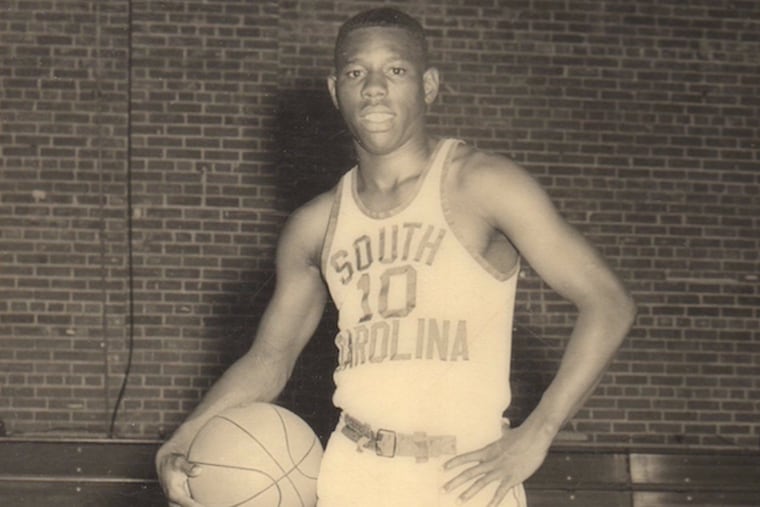Bobby Lewis, former all-star basketball player and coaching innovator, has died at 78
Whenever a list of the all-time Philly basketball greats is published, his name is on it. “He is one of the great ballhandlers in the history of Philadelphia,” Hall of Famer Sonny Hill told The Inquirer in 2001.

Bobby Lewis, 78, of Philadelphia, a flamboyant basketball all-star at John Bartram High School and South Carolina State University in the 1960s, renowned basketball coach and ballhandling instructor for more than 40 years after that, and former director at the Christian Street YMCA, died Thursday, Sept. 19, at his home in South Philadelphia. The cause of death was not immediately known by his family.
Mr. Lewis was a dribbling and ballhandling prodigy as a senior guard at Bartram in 1964. He averaged 17 points per game and was named to the Daily News all-Public League first team.
He grew up playing basketball at the Christian Street YMCA and other rec centers around town, with and against some of the best players in the country. He was personally mentored by NBA star Guy Rodgers. He mentored future Hall of Famer Earl Monroe and later trained dozens of other all-star players.
Whenever a list of the all-time Philly basketball greats is published, his name is on it. “He is one of the great ballhandlers in the history of Philadelphia,” Hall of Famer Sonny Hill told The Inquirer in 2001.
Inquirer sportswriter Bill Simmons said in a 1964 article: “Little Bobby Lewis, a 5-7, 125-pound backcourt wizard, at first looks out of place in this game of giants. But his 15 points a game soon disproves that idea.” Bill Shefski of the Daily News described Mr. Lewis’ style of play as “zipping in and out of traffic like a jaguar on the expressway.”
At South Carolina State, he was nicknamed the “Little Magician.” He was team captain for three seasons, averaged 30.9 points per game in 1968, and was named a first-team small-college All-American by United Press International.
In 1967, he was captain of the gold medal-winning U.S. team at an international tournament in Spain. In 1979, he played for an all-star team that went undefeated and beat teams from China and Cuba in a tournament in Venezuela.
After college, he was drafted by the Dallas Chaparrals and played briefly in the old American Basketball Association. Later, he played in Europe, the old Eastern Professional Basketball League, in Philly’s Baker League, and for touring all-star teams.
He was inducted into the South Carolina State Hall of Fame in 1998 and Philadelphia Black Basketball Hall of Fame in 2017, and was nominated for the Naismith Memorial Basketball Hall of Fame in 2017. “He’s the most exciting player ever recruited by [South Carolina State coach Ed Martin] and the darling of the fans,” a reporter for the Times and Democrat of Orangeburg, S.C., said in a 1966 story.
Mr. Lewis went to Springfield College in Massachusetts, the actual birthplace of basketball, in the late 1970s to earn a master’s degree in education, and his thesis turned into what he called his Basketball Skills Development Program. It’s a 45-minute workout session of more than 50 ballhandling and agility drills, using at least two basketballs simultaneously, and it became his signature presentation at clinics, camps, and assemblies across the country and in Spain, Denmark, Venezuela, and elsewhere around the world.
He dribbled the balls around and through his legs. He juggled them. He bounced them off each other, and most of his players got better over time at rhythm, coordination, dexterity, and balance.
He added one-on-one and classroom study sessions for serious students, and his motto was “ball and mind control builds winners.” He billed his routine as “an educational, revolutionary program,” and superstars Kareem Abdul-Jabbar, Julius Erving, and Bill Walton, and dozens of other top players, coaches, and organizers featured his sessions at their training events.
“Applying yourself through self-motivation is the key,” he told the Philadelphia Tribune in 1985. “It’s a matter of commitment, realizing that you only get out what you invest, no more or less.”
He was an assistant coach for three seasons at Haverford College in the late 1970s, and he counseled actors about improving their basketball portrayals, and consulted with NBA teams and government agencies about training innovations. “Bobby Lewis is the best demonstrator, instructor, and clinician in this field that I have ever seen,” former 76ers coach Matt Guokas said in a letter of appreciation.
Robert Franklin Lewis was born July 25, 1946, in Philadelphia. He also starred in baseball and table tennis as a boy, and appeared in TV commercials for the Tastykake Baking Co. after winning a city youth table tennis tournament and playing in a national championship in New York.
He earned a bachelor’s degree in business administration at South Carolina State and met fellow student Gracie Canty. They married after graduation, had son Brandon, and lived in Philadelphia and Haddonfield. His wife died earlier.
“He was very outgoing and upbeat,” his son said. “He talked a lot, and you could hear his voice two blocks away. He was a magnet. He made people smile. And he loved basketball.”
In addition to his son, Mr. Lewis is survived by two grandchildren, two sisters, two brothers, and other relatives. A sister and a brother died earlier.
A celebration of his life is to be held from 1 to 3 p.m. Saturday, Oct. 5, in sections 20 and 21 at FDR Park, 1500 Pattison Ave., Philadelphia, Pa. 19145.